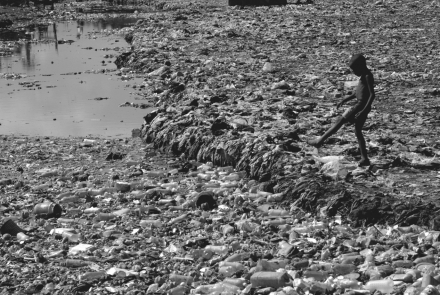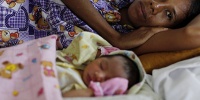
Photo: Thomas Black57 on Wikimedia
Abuse and accountability
The sexual abuse scandal rocking Oxfam Great Britain is a lesson in why organisations need external accountability, Sharon Bessell writes.
The allegations of sexual misconduct and, in some cases, criminal behaviour of Oxfam Great Britain staff in Haiti in 2011 have shocked people around the world. Oxfam’s mission is to end the injustice of poverty. That senior field managers are alleged to have used poverty and desperation as a means of pursuing their own sexual adventures is appalling.
Oxfam has a public image of promoting social justice and human rights, and of speaking out for those who do not have the power to speak out themselves. This is an image that is based on decades of work – through services and advocacy – that has improved the lives of millions and challenged injustice and inequality around the globe.
If the allegations are correct it is clear that power and privilege were grossly abused. More on this:Does the world need an international anti-corruption court?
As the UK Government considers future funding to Oxfam Great Britain, the organisation is in damage control. On 12 February, the Deputy Chief Executive of Oxfam Great Britain Penny Lawrence resigned, taking full responsibility as she stepped down from the role. While the current scandal has focused attention and opprobrium towards Oxfam, it is completely implausible that it is the only organisation with such skeletons lurking in its corporate closet. Abusive, and often criminal, sexual behaviour among peace-keepers and development workers has long been an issue of serious international concern, if not one that has been accompanied by serious action. While attention is currently focused on charitable organisations, governments and private sector organisations may well be feeling uneasy.
The apparent failure of Oxfam Great Britain to deal adequately and appropriately with serious allegations against one of its employees is a striking feature of the sorry tale that has emerged. But it is a failure that is far from unique. The global ‘Me Too’ campaign has demonstrated the pervasiveness and persistence of misogyny and the impunity that perpetrators enjoy.
Similarly, it is hard, from an Australian vantage point, to not be reminded of the revelations of the Royal Commission into Institutional Responses to Child Sexual Abuse. In the case of Oxfam and in the many cases considered by the Royal Commission, two lessons are striking.
First, the power disparities between individuals who are vulnerable and in desperate need and the organisations responsible for meeting that need is enormous. As a result, individuals within those organisations have enormous power. Power is not always abused – in the best situations it is recognised and dismantled – but the risk of abuse is real and the consequences devastating.
Second, institutions must not be responsible for investigating allegations internally. As demonstrated powerfully by the Australian Royal Commission, institutions have too much at stake to be considered independent arbiters. When a crime is committed or suspected, the matter must be handed to the relevant authorities in the relevant jurisdiction. The second issue – that of investigation – is perhaps easier to deal with. Reporting criminal activity and serious misconduct, particularly when it involves suspected sexual abuse, must be mandatory.
In relation to international development, international staff must not be beyond the reach of local law. Allegations of citizens of one country sexually abusing children in another should also be subject to investigation by home authorities where child sex tourism laws are in place.
International organisations – be they charities, government agencies, or businesses – must be required to report allegations made in good faith to the relevant authorities. However, anyone who has worked in the area of international development knows well that reporting to relevant authorities is not easily done in some parts of the world. Additionally, we know that justice is not always impartial and beyond corruption. Yet the absence of functioning systems of justice cannot be used as a justification for ignoring injustice.
Clearly, the time has come to explore how allegations can be pursued within an international court that has jurisdiction over cases that cross borders and breach international law.
The first issue – abuse of power – is far more insidious. In international development, power imbalances are acute.
According to academic research on how new social norms take hold, there is often a tipping point which is followed by a norms cascade whereby new behaviours are more universally demanded. It may be that we are now reaching such a tipping point. In 2016, when a man was elected to the United States presidency despite having boasted of making unwanted sexual advances and grabbing women “by the pussy”, it seemed that the world was moving away from a tipping point that would trigger such a norms cascade. But advocates of justice have responded – with global marches against gender-based violence, the ‘Me Too’ campaign, and a steely determination on the part of women and men around the world that sexual abuse and harassment will no longer be tolerated. There may be cause for optimism.
As we move forward, we must focus squarely on accountability. Organisations must be accountable – and must not be permitted to put their institutional interests beyond the interests of justice. Safeguarding policies and preventative practices are essential – but when allegations of abuse emerge, they must be addressed and externally investigated. This a clear message from the Royal Commission into Institutional Responses to Child Sexual Abuse, and it is a clear message emerging from the Oxfam scandal.
Related to this, individuals must also be held to account. In the case of Oxfam, the organisation’s former Deputy Chief Executive has accepted full responsibility – and clearly responsibility does lie with her and others in Oxfam’s senior management. But the ultimate responsibility lies with individuals who choose to behave in ways that abuse and denigrate others. Right now the world’s attention is rightly focused on the role of institutions, but the responsibility of individuals must also be kept at the forefront. Institutional affiliation or employment status must no longer protect those who use their power and privilege to abuse.
This piece was first published by Policy Forum.net, the website of the Asia and the Pacific Policy Society and Crawford School. https://www.policyforum.net/abuse-accountability-lessons-oxfam-scandal/
Updated: 22 November 2024/Responsible Officer: Crawford Engagement/Page Contact: CAP Web Team













